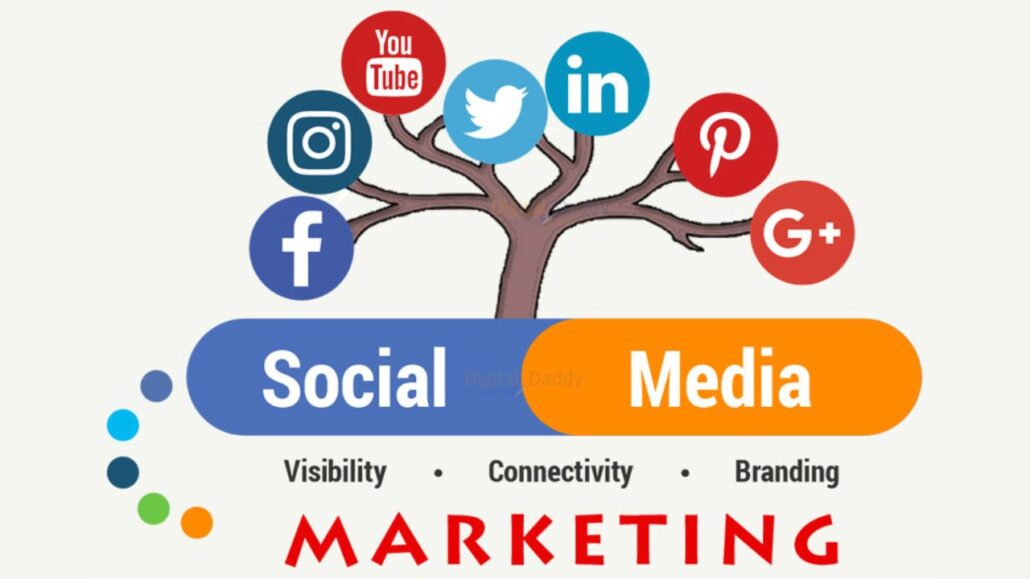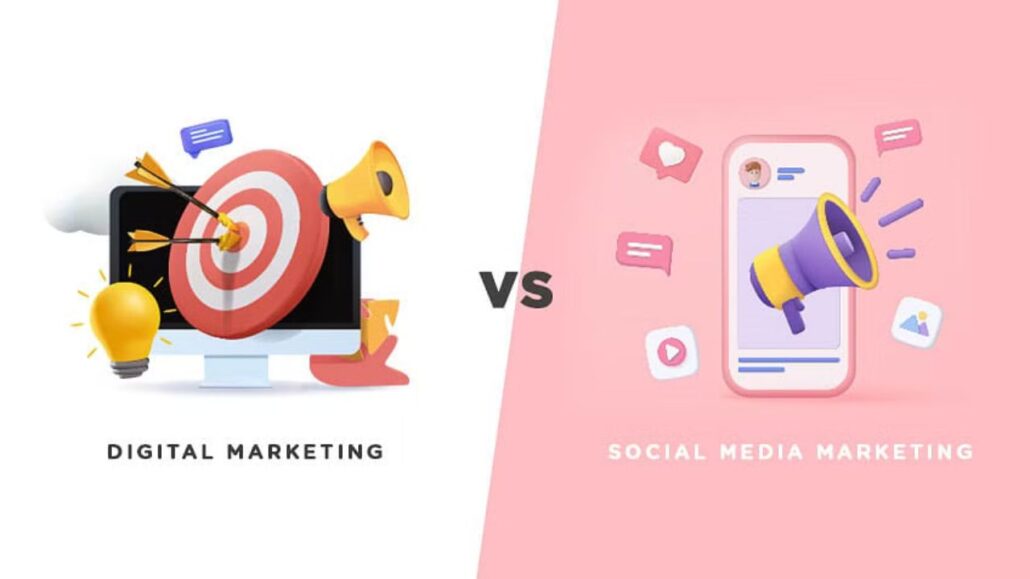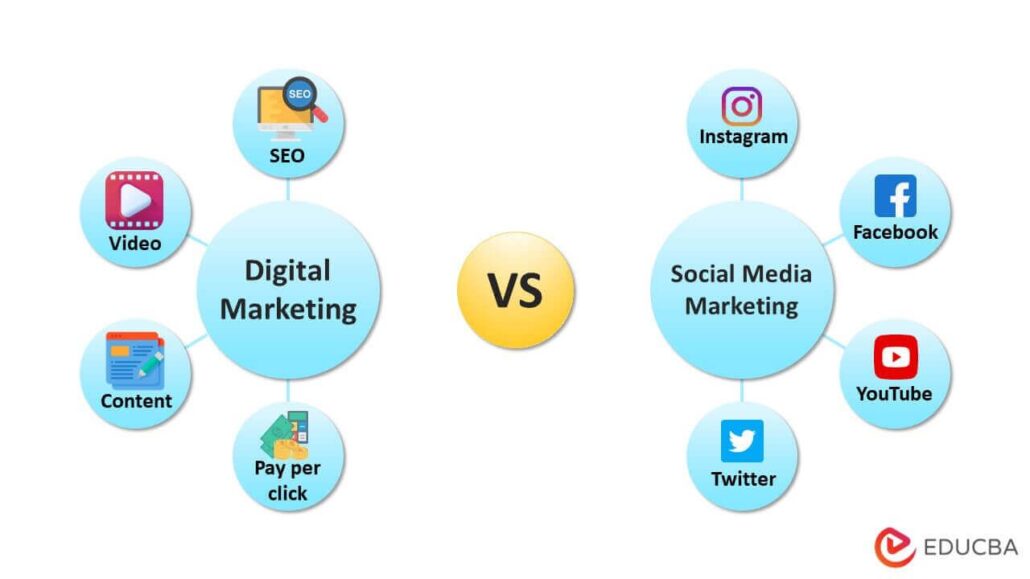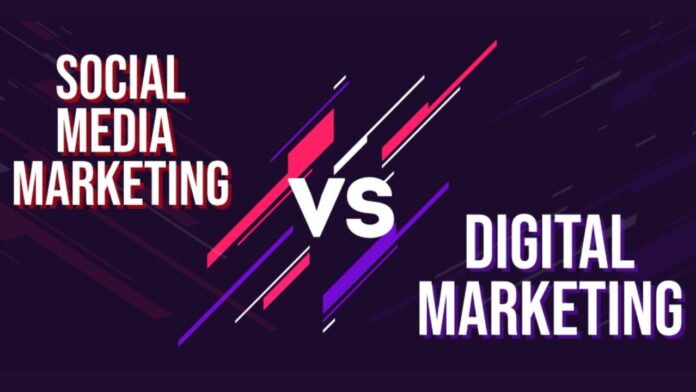In today’s fast-paced digital world, where terms and technologies are constantly evolving, it’s easy to get confused by similar-sounding concepts. Two such terms that are often confused are Digital Media vs Digital Marketing. While they both revolve around the digital realm, they are different. This article will delve into the key differences between digital media and digital marketing, shedding light on their distinct roles, functions, and significance in the modern business landscape.
Digital Media
A Multifaceted World
Digital media refers to any form of content stored in digital format and transmitted over the Internet or through electronic devices. It encompasses various mediums, including text, images, videos, audio, and interactive content. Digital media is the backbone of the online world, serving as the vessel through which information, entertainment, and communication flow.
Types of Digital Media
Textual Content: This includes articles, blogs, ebooks, and social media posts.
Visual Content: Images, infographics, and memes fall under this category.
Audio Content: Podcasts, music, and sound bites are popular examples.
Video Content: YouTube videos, streaming services, and ads dominate this category.
Role of Digital Media
Digital media serves as a means to disseminate information, educate, entertain, and engage audiences. Websites, social media platforms, streaming services, and news outlets rely on digital media to connect with their target audience. It’s all about creating valuable, engaging, and shareable content that captures the audience’s attention.
What is digital media?

Digital media is all content and information created, distributed, and consumed using digital technologies and platforms. This encompasses various media forms, including text, images, audio, video, and interactive content, accessible through devices such as computers, smartphones, tablets, and the Internet. Digital media has revolutionized how we access news, entertainment, communication, and information, offering unprecedented opportunities for creativity, interactivity, and connectivity in the modern world.
What is digital marketing?
Digital marketing strategically promotes products, services, or brands using digital channels and technologies. It leverages the vast reach of the Internet and various digital platforms to connect with target audiences effectively. Digital marketing encompasses a multitude of tactics, including search engine optimization (SEO), social media marketing, email marketing, content marketing, pay-per-click advertising, and more. Its primary objectives are to increase brand awareness, drive website traffic, generate leads, and ultimately, boost sales and revenue. Digital marketing allows businesses to measure and analyze their campaigns’ performance in real-time, making it a highly data-driven and adaptable form of marketing.
Key Differences
Now that we have a clear understanding of what digital media vs digital marketing entails let’s highlight their key differences:
Purpose
Digital Media: The primary purpose of digital media is to provide information, entertainment, or engagement to the audience. It can be educational, informative, or purely for entertainment.
Digital Marketing: Digital marketing aims to promote goods, services, or brands and encourage particular behaviors, such as purchases or sign-ups.
Content vs. Promotion
Digital Media: Digital media focuses on creating and delivering content to the audience. It doesn’t necessarily aim to sell something but to inform, entertain, or engage.
Digital Marketing: Digital marketing is all about promotion. It uses various digital channels and strategies to influence consumer behavior and drive conversions.
Metrics
Digital Media: Success in digital media is often measured by engagement metrics such as likes, shares, comments, and views.
Digital Marketing: Digital marketing success is typically measured by click-through rates, conversion rates, return on investment (ROI), and sales.
Approach
Digital Media: It takes a more general approach, aiming to reach a broad audience and provide value through content.
Digital Marketing: It adopts a targeted approach, identifying specific audience segments and tailoring messages to them for maximum impact.
Tools and Strategies
Digital Media: Tools for digital media include content management systems, multimedia software, and design tools.
Digital Marketing: Tools for digital marketing encompass SEO tools, email marketing platforms, social media management tools, and analytics software.
The Interplay Between Digital Media vs Digital Marketing
While they have distinct roles, digital media and digital marketing are not mutually exclusive. They often work hand in hand. For instance, a company might create informative blog posts (digital media) and use marketing tactics like social media promotion and email newsletters to ensure the content reaches its target audience.
Examples of Digital Media vs Digital Marketing

To illustrate these concepts further, let’s consider some real-world examples:
Digital Media: Think of a YouTube video tutorial on cooking a dish. It’s informative content created to help and entertain viewers.
Digital Marketing: Imagine a sponsored Facebook post from a cooking equipment brand promoting their products alongside the video tutorial. It’s aimed at converting viewers into customers.
Measuring Success in Digital Media and Digital Marketing
Engagement metrics often measure success in digital media. High views, likes, shares, and comments indicate that the content has resonated with the audience. In digital marketing, success is typically measured by key performance indicators (KPIs) aligned with business objectives, such as click-through rates (CTR), conversion rates, and return on investment (ROI).
The Evolution of Digital Media and Digital Marketing
Both digital media and digital marketing have evolved significantly over the years. The rise of social media, mobile devices, and data analytics has transformed how content is created, distributed, and consumed. Additionally, digital marketing has become increasingly sophisticated, with personalized ads and targeted campaigns becoming the norm.
Challenges and Opportunities in the Digital Landscape
As the digital landscape continues evolving, it presents challenges and opportunities. Brands and marketers must navigate the ever-changing algorithms of social media platforms, privacy concerns, and the need to create authentic and valuable content. However, the digital realm also offers unprecedented reach and the ability to connect with a global audience.
Digital Marketing: The Art of Promotion
Digital marketing, on the other hand, is the strategic use of digital channels, platforms, and technologies to promote products, services, or brands. It’s not just about creating content but leveraging it to reach the right people at the right time. Digital marketing employs many tactics to achieve this, making it a crucial aspect of online business growth.

Digital Marketing Tactics
Search Engine Optimization (SEO): Enhancing website visibility on search engines.
Content Marketing: Attracting and retaining customers through valuable content.
Social Media Marketing: Utilizing social platforms to connect with the audience.
Email Marketing: Sending targeted emails to potential and existing customers.
Pay-Per-Click (PPC) Advertising: Running paid ads on search engines and social media.
Influencer Marketing: Partnering with influencers to reach their follower base.
The Symbiosis
While digital media and digital marketing are distinct, they are undeniably interconnected. Digital marketing relies heavily on digital media to convey its message. Engaging, high-quality content is essential for the success of digital marketing campaigns. Conversely, digital media often thrives on digital marketing efforts to gain exposure and reach a broader audience.
Imagine a beautifully crafted blog post (digital media) optimized for search engines (digital marketing). It’s the perfect harmony of content and promotion.
Your Role in the Digital Revolution
In this digital revolution, you play a crucial role. Whether you’re an entrepreneur, a content creator, a marketer, or simply someone navigating the online world, your choices and actions have an impact.
Content Creators
If you’re a content creator, your responsibility is to produce content that informs, entertains, or inspires. Be authentic to your unique voice. Engage with your audience, listen to their feedback, and adapt your content accordingly. Remember that your content shapes the digital landscape and influences how people perceive and interact with the world.
Marketers
As a marketer, your role is to connect the right audience with the right message. Embrace ethical practices, prioritize transparency, and respect users’ privacy. Leverage data and analytics to refine your strategies continually. In this ever-changing landscape, staying updated with the latest trends and technologies is essential for effective campaigns.
Business Owners
If you’re a business owner, digital media and marketing offer unprecedented opportunities to reach and engage with your audience. Invest in effective digital marketing tactics and content development that reflect the principles of your brand. In the digital age, developing customer trust is crucial.
Navigators of the Digital World
Even if you’re not directly involved in content creation or marketing, you’re still a navigator of the digital world. Be mindful of your online interactions and the information you consume. Practice digital literacy, critically evaluate sources, and protect your online privacy.
Content as the Foundation
Digital media, with its diverse array of content types, lays the foundation for effective digital marketing. Compelling articles, visually engaging infographics, entertaining videos, and interactive apps are all part of the digital media arsenal. These assets serve as the building blocks for digital marketing strategies to thrive.
Content Marketing
Content marketing, a subset of digital marketing, relies heavily on high-quality digital media. Engaging blog posts, ebooks, and videos serve as magnets to attract potential customers. When businesses create valuable content through digital media, they establish themselves as authoritative sources in their respective industries.
SEO: The Bridge Between Media and Marketing
Search Engine Optimization (SEO) is a crucial bridge between digital media and digital marketing. It’s the practice of optimizing digital content to rank higher in search engine results. Without SEO, even the most remarkable digital media may remain undiscovered.
Digital marketers leverage SEO techniques to ensure that the content produced within digital media reaches the right audience. Keyword research, on-page optimization, and link-building strategies are all part of the SEO playbook. By aligning digital media with SEO, businesses can boost their visibility and drive organic traffic.
Social Media Amplification
Social media marketing, another integral part of digital marketing, relies heavily on digital media. The captivating images, engaging videos, and informative articles from the digital media sphere find their home on social platforms. Social media acts as a megaphone, amplifying digital content to reach a wider audience.
Viral Potential
In the age of social media, compelling content from digital media has the potential to go viral. A single share or retweet can catapult a piece of content to unprecedented levels of exposure. Digital marketers closely monitor the social media landscape to harness the viral potential of digital media assets.
The Future of Digital Media and Digital Marketing

As technology advances, the digital media and digital marketing landscape is set to undergo significant transformations. Here are some key trends to watch out for in both fields:
Digital Media Trends
Augmented and Virtual Reality (AR/VR): AR and VR technologies will offer immersive digital media experiences. These technologies will revolutionize content consumption, from virtual tours to interactive product demos.
Live Streaming: Live streaming will continue to gain momentum. It provides real-time engagement and authenticity, making it a powerful tool for content creators and marketers.
User-Generated Content (UGC): UGC, such as reviews, testimonials, and social media posts, will remain influential. Brands will encourage and leverage user-generated content to build trust and authenticity.
Personalization: Digital media will become increasingly personalized, with AI-driven recommendations and content tailored to individual preferences.
Digital Marketing Trends
AI and Chatbots: Artificial Intelligence (AI) will play a more significant role in digital marketing. Chatbots will provide instant customer support, and AI will optimize ad targeting and content creation.
Voice Search Optimization: With the growing use of voice-activated devices, optimizing for voice search will become crucial for digital marketers.
Video Marketing: Video content will continue to dominate. Short-form videos, live streams, and interactive video ads will be prominent in digital marketing strategies.
Data Privacy: As data privacy concerns grow, marketers must be more transparent in their data collection and usage practices, emphasizing trust and security.
E-commerce Integration: Digital marketing will seamlessly integrate with e-commerce platforms, making it easier for consumers to purchase directly from ads and social media.
Sustainability and Social Responsibility: Consumers increasingly consider environmental and social issues. Brands that demonstrate sustainability and social responsibility will have a competitive edge.
Localized Marketing: Targeted, location-based marketing will continue to rise, allowing businesses to reach consumers with relevant offers in their vicinity.
Embracing the Future
To thrive in the ever-evolving digital media and digital marketing world, individuals and businesses must remain adaptable and open to embracing new technologies and trends. The synergy between compelling digital media and effective digital marketing strategies will drive success in the digital realm.
Conclusion:
In conclusion, digital media and digital marketing are not the same but inseparable in the digital landscape. Digital media is the content that forms the core of the Internet, while digital marketing is the strategic approach to promote, advertise, and grow through this content. Both are indispensable for businesses, organizations, and individuals looking to make their mark online.
Digital media is the canvas, and digital marketing is the brush that paints the picture of success in the digital age.
FAQ:
Is social media marketing considered digital media or digital marketing?
Social media marketing falls under digital marketing. It involves promoting content on social platforms to achieve specific marketing goals.
Can digital marketing exist without digital media?
Digital marketing heavily relies on digital media to convey messages, attract audiences, and create engagement.
What’s the importance of content marketing in digital marketing?
Content marketing is a pivotal component of digital marketing as it involves creating valuable content to engage and retain customers, ultimately driving business growth.
How can I start a career in digital marketing or digital media?
To start a career in either field, consider taking relevant courses, gaining practical experience, and staying updated with industry trends.
What’s the future of digital media vs digital marketing?
Both fields are expected to continue evolving with advancements in technology. Staying adaptable and innovative will be key to success in the digital realm.



